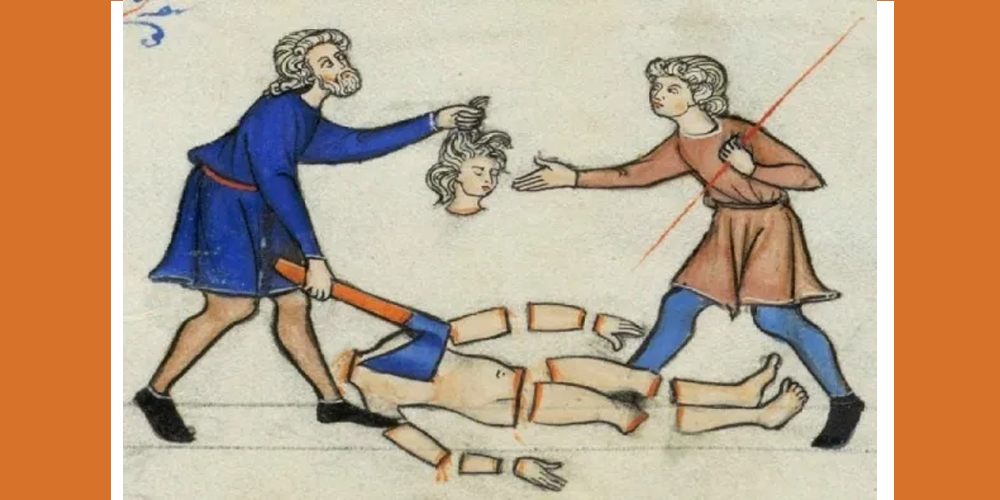I recently was listening through the book of Judges and a story I had not previously taken particular note of (imagine that, as you read on…) caught my attention for the first time. And a little further reading embedded some new facts into my mind for biblical stories and history.
I think a valuable part of truly learning and remembering something is getting to retell it in your own words.
I’m going to do that, knowing I may get a few details wrong or omit something. So after my telling, I will paste it the actual text.
Prior to this story, the book of Judges describes the Benjaminites (the tribe of Benjamin is one of the twelve tribes of Israel) as being fierce warriors and many were “left handed” and able to shoot arrows/sling stones with exceptional accuracy.
There was a Levite (from another of the twelve tribes) who was traveling with his concubine. He was visiting–eating and drinking–with someone and kept delaying his departure. When he got on his way, he came to the city square among the Benjaminites. A man of the city came out to him, urging him not to sleep overnight outside in the city square. The traveler communicated he had food for his animals, and only needed a place to sleep. The man took him into his home.
Then, a crowd of men (Benjaminites) surrounded the man’s house and similar to the scene in Sodom and Gommorah, called for the Levite to be given over to them for sex. To save himself, the Levite (I think the man who owned the home may have advised this) instead sent his concubine out to the men. During the night, the group of depraved Benjaminite men raped and abused the concubine woman all night long, leaving her dead on the doorstep.
In the morning, when the Levite saw his dead concubine, he cut her into twelve pieces and sent each piece of her to each of the twelve tribes of Israel. (I assume he included the leadership of the Benjaminites, as well). This led to a civil war among the twelve tribes known as the “Benjaminite” wars. The tribe of Benjamin was severely massacred including women and children, leaving 600 men only alive.
Then, there was a part where wives were obtained from a group of virgins (I don’t know if Israelite or from the surrounding lands) for these Benjaminites. The text says that within forty years, their settlements and towns were gradually rebuilt. I read that the apostle Paul was from the tribe of Benjamin.
A Levite and His Concubine
19 In those days Israel had no king.
Now a Levite who lived in a remote area in the hill country of Ephraim took a concubine from Bethlehem in Judah. 2 But she was unfaithful to him. She left him and went back to her parents’ home in Bethlehem, Judah. After she had been there four months, 3 her husband went to her to persuade her to return. He had with him his servant and two donkeys. She took him into her parents’ home, and when her father saw him, he gladly welcomed him. 4 His father-in-law, the woman’s father, prevailed on him to stay; so he remained with him three days, eating and drinking, and sleeping there.
5 On the fourth day they got up early and he prepared to leave, but the woman’s father said to his son-in-law, “Refresh yourself with something to eat; then you can go.” 6 So the two of them sat down to eat and drink together. Afterward the woman’s father said, “Please stay tonight and enjoy yourself.” 7 And when the man got up to go, his father-in-law persuaded him, so he stayed there that night. 8 On the morning of the fifth day, when he rose to go, the woman’s father said, “Refresh yourself. Wait till afternoon!” So the two of them ate together.
9 Then when the man, with his concubine and his servant, got up to leave, his father-in-law, the woman’s father, said, “Now look, it’s almost evening. Spend the night here; the day is nearly over. Stay and enjoy yourself. Early tomorrow morning you can get up and be on your way home.” 10 But, unwilling to stay another night, the man left and went toward Jebus (that is, Jerusalem), with his two saddled donkeys and his concubine.
11 When they were near Jebus and the day was almost gone, the servant said to his master, “Come, let’s stop at this city of the Jebusites and spend the night.”
12 His master replied, “No. We won’t go into any city whose people are not Israelites. We will go on to Gibeah.” 13 He added, “Come, let’s try to reach Gibeah or Ramah and spend the night in one of those places.” 14 So they went on, and the sun set as they neared Gibeah in Benjamin. 15 There they stopped to spend the night. They went and sat in the city square, but no one took them in for the night.
16 That evening an old man from the hill country of Ephraim, who was living in Gibeah (the inhabitants of the place were Benjamites), came in from his work in the fields. 17 When he looked and saw the traveler in the city square, the old man asked, “Where are you going? Where did you come from?”
18 He answered, “We are on our way from Bethlehem in Judah to a remote area in the hill country of Ephraim where I live. I have been to Bethlehem in Judah and now I am going to the house of the Lord.[a] No one has taken me in for the night. 19 We have both straw and fodder for our donkeys and bread and wine for ourselves your servants—me, the woman and the young man with us. We don’t need anything.”
20 “You are welcome at my house,” the old man said. “Let me supply whatever you need. Only don’t spend the night in the square.” 21 So he took him into his house and fed his donkeys. After they had washed their feet, they had something to eat and drink.
22 While they were enjoying themselves, some of the wicked men of the city surrounded the house. Pounding on the door, they shouted to the old man who owned the house, “Bring out the man who came to your house so we can have sex with him.”
23 The owner of the house went outside and said to them, “No, my friends, don’t be so vile. Since this man is my guest, don’t do this outrageous thing. 24 Look, here is my virgin daughter, and his concubine. I will bring them out to you now, and you can use them and do to them whatever you wish. But as for this man, don’t do such an outrageous thing.”
25 But the men would not listen to him. So the man took his concubine and sent her outside to them, and they raped her and abused her throughout the night, and at dawn they let her go. 26 At daybreak the woman went back to the house where her master was staying, fell down at the door and lay there until daylight.
27 When her master got up in the morning and opened the door of the house and stepped out to continue on his way, there lay his concubine, fallen in the doorway of the house, with her hands on the threshold. 28 He said to her, “Get up; let’s go.” But there was no answer. Then the man put her on his donkey and set out for home.
29 When he reached home, he took a knife and cut up his concubine, limb by limb, into twelve parts and sent them into all the areas of Israel. 30 Everyone who saw it was saying to one another, “Such a thing has never been seen or done, not since the day the Israelites came up out of Egypt. Just imagine! We must do something! So speak up!”
__________
This is quite a story. I was listening on Audible, and now as I pasted in the above account from scripture, I read/note that the Levite was visiting with the concubine’s father, and she had been unfaithful to him. This adds another layer to this intriguing story.
The most obvious question in all of this is “why would the Levite dismember the concubine and circulate her twelve parts to each of the twelve tribes?”
It seem on initial consideration that this is an equally barbaric thing to do. When we encounter such seemingly shocking stories in scripture, I think it is an invitation to go deeper, and to ask questions and explore. Not to simply dismiss a part of scripture as either horrific or having nothing to teach us.
We must realize the context and culture of those times, even if it seems so unthinkable. As I consider his actions, my take on it is that the Levite felt a need to confront the other tribes with the shocking reality of what took place, and he was seeking justice be done. I take note for the first time, that the US Jury System has twelve jurors, and I wonder if it is, in part, based upon Judeo-Christian history. Jesus had twelve disciples, also. The twelve bore witness to the life, death, resurrection and teachings of Jesus. A jury of twelve will arrive at a consensus for justice, in this nation.
So, the Levite sent out quite an unusual call for justice and apparently, included the Benjaminites, too. I wonder what might have happened had their leaders taken responsibility and dealt with what led to such a thing? Like many accounts in scripture, there seem to be gaps that hold our questions…such as…how much time elapsed…was the war a result of failure of the Benjaminities to act and make restitution/bring justice? How were these body parts delivered and to whom and with what message and how was that presented (verbally, written?) Or, did they just get the body part and have to figure it out? Were there already rumors about the event circulating? Did the Levite feel compelled to present the evidence so he would be believed?
One quick search brings up this article, which is a good, quick read.
What does Judges 19:29 mean?
And now, if you want to hear the rest of the story from the text, here is Judges 20-21 about the Benjaminite War.
Judges 21 is the last of the book, and ends with this sentence:
“25 In those days Israel had no king; everyone did as they saw fit.”
Thank You For Reading
Please Feel Free To Express Your Thoughts Below




